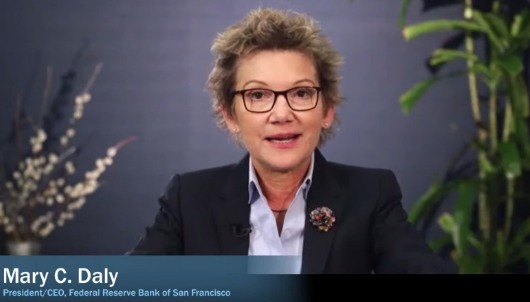
San Francisco Fed Pres. Mary Daly comments:
- Prudent to refrain from commenting on Fed policy action
- Declined to say what Fed should do at June meeting
- Wants to see if policy tightening is affecting economy
- Banking stress have a calm, banks are in solid shape
- Fed must be very dependent right now
- Still lots of data to get before June FOMC
- Tighter credit conditions may akin to 1 to 2 rate hike's
- The Fed must be on watch for a slowing economy
- Inflation expectations are well anchored
- FOMC deciding meeting by meeting is a more prudent path
- global tightening cycle has slowed activity less than expected
- Federal Reserve balance sheet drawdown working effectively
- sees some size of slowing on otherwise a stronger job market
- Fed forecasts only as good as the day they were printed
- Real wage growth for most Americans overtaken by inflation
- Not surprising to see some rising credit troubles for some Americans
- Would-be historical anomaly to get 2% inflation with sub 4% unemployment
- seems reasonable to see unemployment go above 4%
Daly takes a pass on Fed policy and is in the neutral camp. She joins Fed's Kashkari who earlier today said it was too early to commit but was more hawkish. A summary of Kashkari's comments this morning:
Minneapolis Federal Reserve President Neel Kashkari made several critical comments regarding the current state of the U.S. economy. He noted that the decision to raise interest rates or pause in June was a close call, indicating some uncertainty in the Fed's future policy direction. Kashkari expressed concern over inflation, mentioning that he saw no evidence of banking stress contributing to inflation control, suggesting that the Fed needs to remain vigilant in its fight against rising prices. He also pointed out that inflation within the services sector appeared to be firmly established, which could indicate persistent upward price pressures. Furthermore, Kashkari hinted that the Federal Funds Rate might have to climb above 6% to effectively combat inflation, though he cautioned that such a move wasn't yet clear. His comments reflect the ongoing challenges faced by the Fed in managing inflation in an uncertain economic environment.
Fed's Bullard meanwhile was more hawkish. A summary of his comments:
St. Louis Federal Reserve President James Bullard made remarks suggesting a cautious outlook for the U.S. economy. He maintained his base case of relatively slow growth for the rest of the year and into 2024, while downplaying arguments of an impending recession as overstated. Bullard pointed out that the September median Fed funds target of 5.11% was based on expectations of slow growth and improvements in inflation that have not yet materialized. Consequently, he suggested that the Fed might need to raise the policy rate further, potentially by another 50 basis points this year from the current rate of 5.25%, to combat inflation. Bullard emphasized the need to fight inflation during a period of strong labor market conditions and noted that companies were still scrambling for workers, with job growth above trend. Despite stating that core measures of inflation have not changed much in recent months, he warned that if inflation isn't controlled, the Fed would have to take more substantial action. He urged the Fed to err on the side of doing more, reflecting a sense of urgency in addressing inflation. Lastly, Bullard highlighted the decoupling from China as a significant issue for the U.S. and stated that he doesn't anticipate changes to Quantitative Tightening (QT) anytime soon.
Kashkari is a voting member in 2023, while Daly and Bullard are not.



